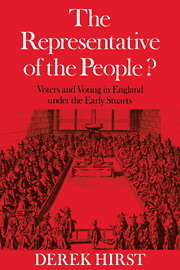10 - Conclusion
Published online by Cambridge University Press: 15 December 2009
Summary
England on the eve of the Civil War cannot be classed as politically closed for several important reasons. The King's government and Court certainly formed an extremely restricted world, but there were avenues of expression through parliament open to those outside, and those avenues were becoming broader. The spectacle of men like Sexby and Allen rising from the ranks to become senior officers in the New Model Army was not to be matched before the war – although perhaps six yeomen did sit in the Long Parliament House of Commons – but such people did have some outlet for their political aspirations, and some means of gaining a political education before that assembly of saints on the march known as the New Model Army came into being. The Privy Council felt that elections were in themselves dangerously likely to disturb the tranquillity of the lower depths of society. After the disputed Buckinghamshire election of 1604 necessitated a second election, the Council warned the local JPs to take care, ‘respectinge the Mean and inferior sorte of that Cuntrie whom this busines by severall elleccions hath afflicted and troubled’. If even personal disputes risked arousing the meaner sort, the potential of more and more excited campaigns in later years cannot be underestimated. The high levels of turn-out in Wigan and Tewkesbury in 1640, the occurrence of rioting in London in the spring of 1640 and Windsor Forest in 1641 geared to the frustration of parliamentary hopes, all indicate that the common people had a very real interest in their representative.
- Type
- Chapter
- Information
- The Representative of the People?Voters and Voting in England under the Early Stuarts, pp. 189 - 194Publisher: Cambridge University PressPrint publication year: 1975



